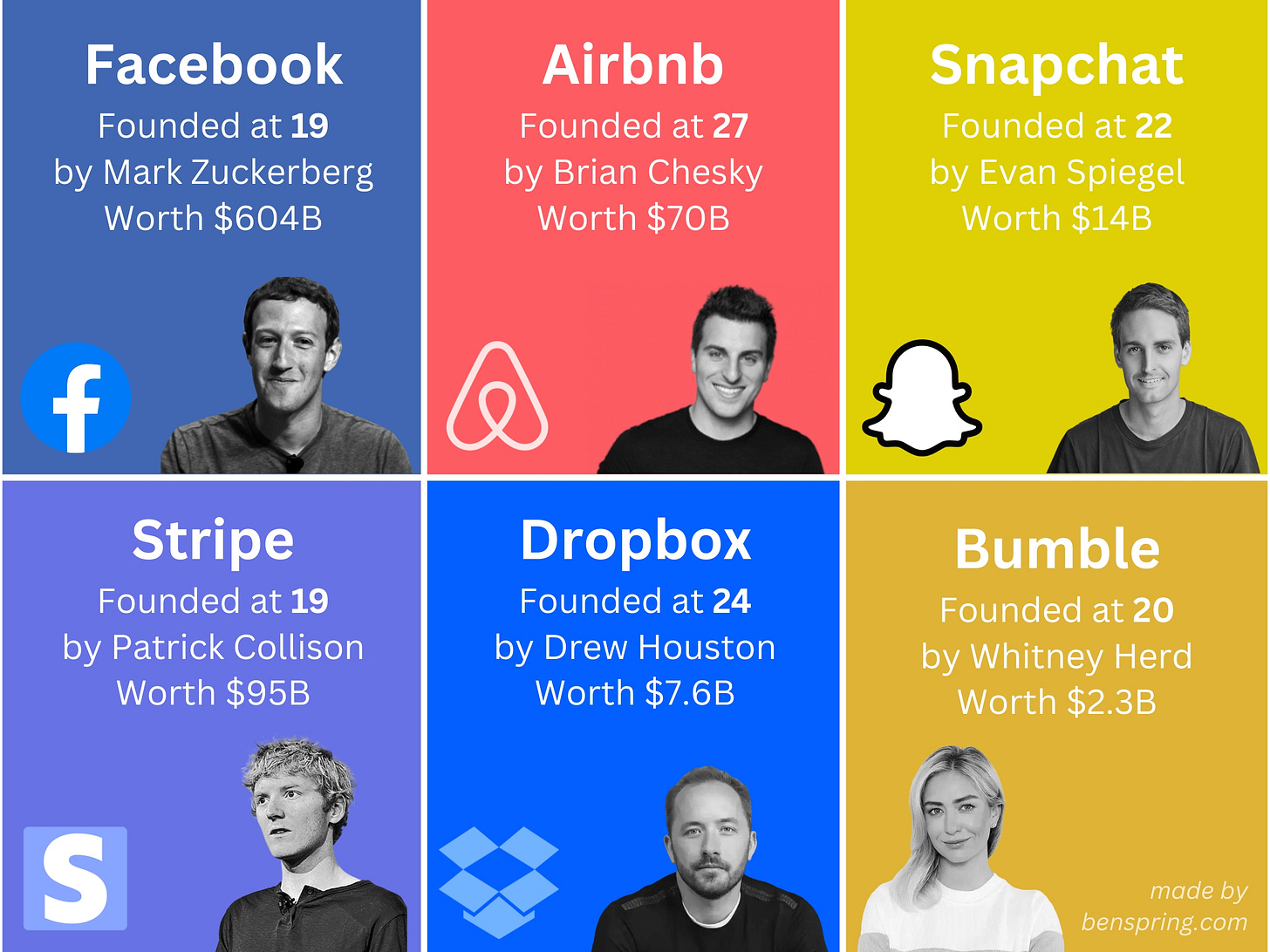Young entrepreneurs have a big advantage
Being a young founder gives you more chance of success. 52% of YC’s billion dollar company founders were under 28 years old.
You have fewer responsibilities the younger you are. The earlier in life you start, the better. Starting a company can seem daunting enough, and you have a certain element of risk with any new startup, but the earlier you start the better.
Here are a few reasons its better to start younger:
💸 Money - 9 in 10 startups fail, and there is a high personal risk when founding a company, which comes with unnecessary pressure. As a young entrepreneur, you’re less likely to have a mortgage, a family that relies on you, or other life-dependent financial commitments.
🕒 Time - With fewer responsibilities, you can invest more time into your startup, which would otherwise be spent on school, work, compulsory activities or family.
🙃 Naivety - Founding a company is hard work, and people often underestimate the work required to get it on its feet. If you know just how hard something will be (short and long-term), you’re much less likely to keep going. This can also force you to think about (and innovate) solutions to problems in untraditional but better ways.
Need some confidence as to why you should start now? YCombinator (YC), a technology startup accelerator, released a few stats that will encourage you:
52% of YC’s $90 billion dollar company founders were under 28 years old
The oldest person to found a billion-dollar company (that YC invested in) was 50
There are also other reasons that can give you an edge as a young founder, such as being brought up in the digital age (being more familiar with technology) and having greater energy and enthusiasm. However, there are disadvantages to be mindful of:
🫠 You’re not always taken seriously - Some customers or companies you want to partner with may perceive younger entrepreneurs as inexperienced or not serious.
💼 Lack of commercial (and life) experience - in the early days you wear many hats as a founder and won’t have as much practical experience to lean into. Finding a co-founder, networking (or hiring) with smart people and learning through books/podcasts can help but still won’t substitute pure experience.
I don’t believe having less financial resources is that much of a downside. Having limited resources makes you more scrappy, and rather than burning aggressively through your raised capital, you’re forced into finding efficient and scalable solutions to start.
However, capital can play a big part in growth, from your user acquisition strategy or product development to hiring talent, but it is possible to scale profitably without it. You can seek investment, but I’d highly recommend you validate your idea as quickly as possible, fail fast, and (if needed) pivot - you don’t need much to start in 2023.
This doesn’t mean you can’t start and succeed in starting a company if you’re older, but take the opportunity whilst you’re younger and can afford to fail.
You’d be surprised how young some of the most successful founders are - shown in the image below:
Mark Zuckerberg, founded Facebook at 19 from his University dorm room after his failed “Fashmash” project was forcefully shutdown.
Evan Spiegel, founded Snapchat at 22 whilst at University after being inspired by a class project which evolved into building a destructible photo app.
Brian Chesky, founded Airbnb at 27 after being unable to find a hotel for a design conference in 2008.
Drew Houston, founded Dropbox at 24 after forgetting his USB flash drive when traveling in 2007.
Patrick Collison, founded Stripe at 19 after dropping out of University to pursue entrepreneurial ventures
Whitney Herd, founded Bumble at 20 and was also a founder of Tinder.
All of these companies were started by people no smarter than you. Even if you start and fail, you gain experience, which snowballs into your next venture. Everyone has ideas, but people rarely act on them - maybe it’s because you think you don’t have enough experience or are telling yourself you don’t have time; if it’s important enough, you’ll make the time.
Start whilst you’re young. Start now.
Subscribe for weekly advice on how to succeed in building and scaling your first company.




